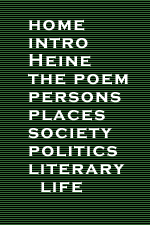| |
|
|
| |
the
journey |
|
|
| |
overview |
route
close-up |
topographical
detail |
|
|
|
[img]
title from Germany,
by Streit, 1842
|
[img]
title from Arrowsmith, Germany, c. 1803 |
|

| |
the
text |
notes
and resources |
| |
Caput
II |
|
| |
|
|
| |
|
|
| 1 |
While
thus the maiden trilled and strummed,
The joys of heaven forestalling,
My box the Prussian douaniers
Were carefully overhauling.
dt
text .
|
•
Prussian douaniers: Prussian customs officials.
Among other things, Heine underscores the fact that
the Rhine territories were given to Prussia after the
Congress of Vienna
•
•
|
| 2 |
They
poked among handkerchiefs, shirts, and hose;
They rummaged in likely places;
They were nosing about for prohibited books,
And jewelry and laces.
dt
text .
|
•
|
| 3 |
Ye
fools, who turn my boxes out,
There's nothing there forbidden;
The contraband I travel with,
In my head is safely hidden!
dt
text .
|
•
|
| 4 |
You
will find neither Mechlin nor Brussels lace,
'Tis with what's in my head I trick you;
I warrant, were I to unpack my point,
It would prettily tease and prick you!
dt
text .
|
•
Both Mechlin (Mecheln/Mechelen; also known as Malines)
and Brussels are famous for lace production.
Heine indulges in one of his typical plays on words, for
he employs the plural, "Spitzen," which means
both "points" and "lace." Appropriately
enough, "Spitze" can also mean the nib of a
pen or a barbed, sarcastic remark. |
| 5 |
I
carry the royal diamonds there
Of the Future, and need not falter:
The gems of the new, the unknown God,
That shall blaze upon his altar.
dt
text .
|
•
|
| 6 |
Oh,
many a book I have stowed away;
I am speaking in moderation
When I tell you my brain is a warbling nest
Of books for confiscation.
dt
text .
|
•
|
| 7 |
Believe
me, in Satan's library
Not one is worse or stranger;
Hoffmann von Fallersleben's own
Are not so fraught with danger.
dt
text .
|
• August
Heinrich Hoffmann von Fallersleben (1798-1874): a
reference to contemporary political scandal. (Here, as
in many other places in the text, Heine takes pains to
be au courant.) Hoffmann
was fired from a position as professor of language and
literature in Breslau following the appearance of his
ironically titled Unpolitischen Lieder (Unpolitical
Poems) in 1840-41 over the imprint of Heine's publisher
Campe. Campe's sponsorship of this work and a similar
one prompted the Prussian government to ban all products
of his presses.
Heine held Hoffmann, like most political poets and all
nationalists, in very low esteem. As he said to Campe,
the poems were "miserable jokes for Philistines to
amuse themselves over beer and tobacco."
Today Hoffmann is remembered almost exclusively for his
"Lied der Deutschen" (Song of the Germans),
which begins with the line, "Deutschland, Deutschland,
über alles." The point of the poem was not chauvinism
but national unity: the need for allegiance to an overarching
German identity at the expense of the local and particularistic.
At this time, nationalism was in many ways a radical idea
in the eyes of the authorities. |
| 8 |
A
traveller standing by remarked
We had reached the chain of duties
Known as the Prussian Zollverein,
And enlarged upon its beauties.
dt
text .
|
•
Zollverein: Customs Union, which abolished tariffs
and set up a sort of free trade zone among members. A
smaller regional agreement led to the establishment of
ties between Prussia, Saxony, Hesse, Bavaria,and Württemberg
in 1834. As in the case of post-World War II Europe, economic
unification paved the way for political unification, and
with similar power dynamics. |
| 9 |
"By
the Zollverein," he went on to say,
"Our national life is founded,
And our poor divided Fatherland
To one whole at last is rounded.
dt
text .
|
•
|
| 10 |
The
Zollverein gives a unity
Which is obvious and real;
The unity born of the censorship
Is the deeper, the ideal.
dt
text .
|
•
|
| 11 |
"The
censorship unifies thought and soul.
What we want—and the goal is sighted—
Is a Germany welded to one great whole,
Without, within, united."
dt
text .
|
•
Censorship by this time had three traditional principal
targets: threats to religion, morality, and the state,
all of which were among Heine's favorite subjects of satire.
Censorship regulations were greatly tightened with the
promulgation of the Carlsbad Decrees in 1819, following
a political assassination carried out by a radical student.
Censorship was a particular sore point for Heine because
the German Federation in 1835 banned not just the existing
works, but all future publications by him and other writers
identified with the movement of "Young Germany." |
|
| |
 |
|
|
|
|
|











